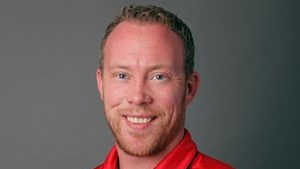
‘You have to do it for yourself’: Former Olympian Jonas Persson inspiring Utah athletes
SALT LAKE CITY (BVM) – Born and raised in Malmo, Sweden, Jonas Persson’s story is far from boring. With a human lesson for everybody in sports and a curious journey, Coach Persson has a lot to give back.
The journey has taken him from the 2008 Beijing Olympics listening to heavy metal music to push away negative thoughts before the final, to the pool deck in Utah.
“I didn’t want to be a business person, I wanted to do something meaningful,” Persson said.
He first came to the U.S., specifically Arizona, in 2004 where he stayed for two years, but he didn’t like it. After a period back home, he decided to retry and landed in Tennessee.
“There, I got all the kind of success that I wanted, that I was planning for, and that I dreamed of,” Persson said of his European Championships medals, national titles, and the Olympics.
He went to grad school and got his Master’s in Business and Sport Studies, and he was a grad assistant as well. Persson had to step in and help out when the assistant coach at Tennessee got sick and passed away.
“That is when I started liking the job,” he said.
He started to apply for coaching jobs in 2011 and ended up having an interview at the University of Utah. The school hired him to stay there for five years as an assistant coach for the sprint group, and then he went to Toledo (Ohio) Division 1 for a position as a head coach.
He got recruited to come back to Utah in the fall of 2019.
“Utah has always been way better than I have ever imagined,” Persson said. “It is a good place to live.”
After grad school, going back home wasn’t an option for Persson. He likes new experiences and people who are not similar to himself.
“If I was going back to Sweden, there are a lot of people like myself and it gets frustrating,” Persson said. “I like to be good at something in the U.S. because it is rewarding. You have a much better life here personally and financially.”
His transition from being an Olympian to being a coach was quite smooth. He has always been passionate about fast swimming and having good sprinters at the beginning of his career as a coach definitely helped him and made it fun.
“Swimming has been part of my life,” Persson said. “It’s fun to coach most of the time, it adds meaning to my life and I get to work with something I’m interested in. Not everything is always great, but it is a nice combination and better than having an office job 9-5.”
He made the Olympics while at Tennessee. In 2001-02, he joined the national team and, in 2006, he was “pretty done with the time there.”
“I was tired of the process, my performances, and the people in it,” Persson said. “I was quite done and declined also to go to Worlds in Australia in 2007.”
So how did he make it to the Olympics? His secret was to start thinking and focusing on himself, the team and just go out to see how far he could push himself.
“I am gonna do this for myself,” he started thinking. “I think sometimes people swim for the wrong reasons. You have to go out and swim for yourself, perform because you wanna do it, and see how far it can take you. That’s it.”
At the European Championship in 2008, he won the 4x100m freestyle relay alongside teammates Marcus Piehl, Petter Stymne, and Stefan Nystrand, and he made the A cut in 100m freestyle for the Olympics. He kept it very simple: wall and back as fast as possible.
His secret was not to think about it. The Olympics were not an obsession, but a bonus, an addition to his already happy life.
From being nobody to becoming an Olympic finalist, Persson’s biggest achievement as an athlete was to improve in Beijing.
“A lot of people go to the Olympics, but they do not do well. Instead, I improved and had success, maybe more than people thought I would.”
Although, it was hard to get back to being a regular student and do a normal college season.
“I swam an Olympic final on a Friday, and on Wednesday, I started school.”
Taking time off was very needed, as he didn’t have a great season after that and injured his shoulder.
“You go from doing these amazing things to just being normal. It was hard.”
Persson retired at age 26 in 2010 when he competed in his last competition.
“The Olympics are just a competition, but being an Olympian is something that you have for the rest of your life. You sacrifice so much for, and now you can read the benefits for the rest of your life with people respecting you.”
An experience of a lifetime, being an Olympian is probably the dream of every athlete and Persson realizes that because “it is not physical, it is that you are mentally capable of achieving something so big that you take that with you in other things of life.”
He has nothing to prove to anybody, and that is why he decided not to tattoo the famous “Olympics rings”. Persson’s confidence wasn’t dictated by a tattoo.
“I just proved it to myself that I did it. I don’t have to walk around and show it to people or remind myself of it to myself. I know what I did and I know who I am.”
His biggest achievement personally is his family, wife, Darby, and 4-year-old daughter Novali Mae.
The Jonas Persson of 2022 knows he is special and with coaching, he is giving all his experience, philosophy, and knowledge back. Lucky are those athletes crossing paths with Persson and certainly the Utah swim and dive team which has an inspiring figure leading the sprint group.
“You gotta have fun while doing it and you gotta do it for yourself, not your parents, not your friends, not your coach, but you gotta do it because you wanna do it and you believe it. Otherwise, it doesn’t mean anything. And it’s just swimming.”








